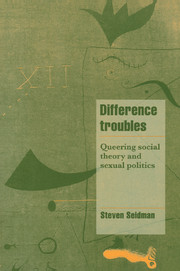Book contents
- Frontmatter
- Contents
- Preface
- Acknowledgements
- Introduction: the contemporary reconfiguring of social theory
- Part I Resisting difference: the malaise of the human sciences
- 1 The political unconscious of the human sciences
- 2 The end of sociological theory
- 3 Relativizing sociology: the challenge of cultural studies
- 4 The refusal of sexual difference: queering sociology
- 5 Difference troubles: the flight of sociology from “otherness”
- Part II Engaging difference: from lesbian and gay studies to queer theory
- Part III Democratic prospects: the politics of knowledge and identity
- Epilogue: pragmatism, difference and a culture of strong democracy
- Notes
- References
- Index
2 - The end of sociological theory
from Part I - Resisting difference: the malaise of the human sciences
Published online by Cambridge University Press: 05 October 2010
- Frontmatter
- Contents
- Preface
- Acknowledgements
- Introduction: the contemporary reconfiguring of social theory
- Part I Resisting difference: the malaise of the human sciences
- 1 The political unconscious of the human sciences
- 2 The end of sociological theory
- 3 Relativizing sociology: the challenge of cultural studies
- 4 The refusal of sexual difference: queering sociology
- 5 Difference troubles: the flight of sociology from “otherness”
- Part II Engaging difference: from lesbian and gay studies to queer theory
- Part III Democratic prospects: the politics of knowledge and identity
- Epilogue: pragmatism, difference and a culture of strong democracy
- Notes
- References
- Index
Summary
Sociological theory has gone astray. It has lost most of its social and intellectual importance; it is increasingly disengaged from the conflicts and public debates that have nourished it in the past; it has turned inward and is largely self-referential. Sociological theory is today produced and consumed almost exclusively by sociological theorists (cf. Geertz 1983; Sica 1989; Skocpol 1986; Turner and Wardell 1986). Its social and intellectual insularity accounts for the almost permanent sense of crisis and malaise that surrounds contemporary sociological theory. This distressing condition originates, in part, from its central project: the quest for foundations and for a totalizing concept of society.
The renewal of sociological theory as a critical public discourse requires that we disavow scientism, i.e. the increasingly absurd claim to be an epistemically privileged discourse. We should relinquish our quest for foundations or the search for the one correct or grounded set of premises, conceptual strategy, and explanatory model. Sociological theory will be reinvigorated if and when it becomes “social theory.” My critique of sociological theory and advocacy of social theory as a social narrative with a moral intent will be advanced from the standpoint of a “postmodern” perspective (regarding postmodernism, see Bauman 1988; Brown 1990; Kellner 1988; Kroker and Cook 1986; Lemert 1991; Nichoson 1990; Seidman and Wagner 1991).
Anticipating the end of sociological theory entails renouncing the millenarian social hopes that have been at the center of modernist sociological theory (cf. Baudrillard 1975,1981; Foucault 1978, 1980; Lyotard 1984). “Postmodernism,” or at least the version I will defend, carries no promise of liberation – of a society free of domination.
- Type
- Chapter
- Information
- Difference TroublesQueering Social Theory and Sexual Politics, pp. 43 - 60Publisher: Cambridge University PressPrint publication year: 1997
- 1
- Cited by

